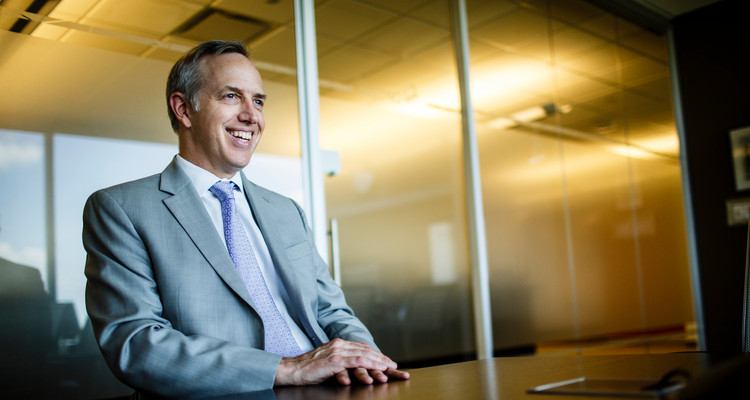As an undergraduate student at Marquette University, Brian Wenger wasn’t sure what career to pursue. The economics major with minors in philosophy and English was interested in law and business. First stop was graduate school, but he was undecided between a law degree and an M.B.A.
So he consulted with a family friend who gave him this advice: You can be a business executive with a law degree but you cannot be a lawyer with an M.B.A.
Decision made. Law school it would be: Villanova University.
Three decades later, the advice has proved to be wise, if not providential. Wenger skillfully has blended dual interests in business and law to serve as chairman of a large Minneapolis law firm, adviser to one of the best-known business families in Minnesota and outside counsel involved in the construction of new stadiums for two professional sports teams and the sale of a third team.
For the past year, Wenger has been executive vice president and chief legal officer of Optum, a UnitedHealth Group division with $47 billion in annual revenues. His role, however, is more than just lead attorney; he also is an active participant in the company’s strategic initiatives.
“I went to law school because it presented flexibility,” he said, “and I always had an interest in both the business and legal sides of an issue. I guess you could say the decision played out well.”
Actually, Wenger might have dreamed about a different line of work as a teenager growing up in suburban Detroit. The oldest of four sons of a father in the auto supplies business and a mother who today runs a national association for children of alcoholics, he worked at a golf course and loved to play the game.
“Marquette and Villanova were my top choices for college,” he said. “Marquette had a varsity golf team and Villanova didn’t. I thought golf would be a laudable extra in college. I played for three seasons, but I found out there was more to college than golf. Other extracurricular activities became more enticing.”
After graduating in 1983, he enrolled at Villanova for law school, feeling “overwhelmed” at times but never that he had made the wrong choice. He received a two-year clerkship with a federal judge in Fort Worth, Texas, and a short time later, Kate Gregor, the Villanova law student he had been dating, received a one-year clerkship with the only other federal judge in Fort Worth.
“It was sheer coincidence, or better yet fate,” he said. “We applied to judges before we were dating. There was an unwritten rule that you should accept your first offer, which I did. A couple of weeks later Kate received her first offer, which she also accepted.”
Briggs and Morgan hired him in 1988 and he married Gregor the following year; they have six children, ages 8 to 24. He found the firm a perfect fit, appreciating the collaboration between partners and associates, an “eclectic atmosphere where individual styles were allowed to thrive,” and activism in community and civic organizations.
Wenger soon transitioned into business law, including mergers and acquisitions. An early client was the Pohlad family, owner of the Minnesota Twins and then a significant owner of PepsiAmericas, which became the second-largest bottler and distributor of Pepsi products in the United States. He represented the Pohlads on the Pepsi account for two decades, culminating in the $2.1 billion sale of PepsiAmericas to PepsiCo in 2010, and today he is the only nonemployee on the Pohlad board.
“Brian is a very good attorney with a style that is cordial, but underneath he can be very aggressive and determined on issues,” said Bob Pohlad, chair of Dakota Holdings, which operates the Pohlad family businesses. “He is a man of very strong and solid character. He does what he says he’ll do, and he does it the right way. Flat out, he is a quality guy in terms of his values.”
Involvement with the Pohlads led to an opportunity to work with the Twins as they built Target Field. The Pohlads referred him to Bob Naegele, the original majority owner of the Minnesota Wild, and Wenger was involved in the 2008 sale of the team. His Target Field experience led him to legal work on U.S. Bank Stadium, now under construction for the Minnesota Vikings.
“I enjoy the sports environment a great deal,” he said. “I am a fan, but there’s deeper involvement when you get to know the owners and players and are involved in putting together elements of the business, including a team and a new field or stadium. The owners’ groups treat their attorneys like family, and that is very special.”
Wenger’s responsibilities continued to grow at Briggs and Morgan, and he was chair of its business law section and commercial department before becoming the first chair of the 165-attorney firm in 2011. He spent 75 percent of his time on client work and 25 percent as chair, and considered himself a “lifer.” But then he received a phone call from Steve Hemsley, CEO of UnitedHealth Group, and Marianne Short, the company’s executive vice president and chief legal officer. (Both are former St. Thomas trustees.)
“The first call was to work on a project with them,” Wenger said. “Four months later, I received a second call – about an employment opportunity.”
It was a very difficult decision. He was grateful for his 26 years at Briggs and Morgan and wanted to make sure Optum, the health care services arm of UnitedHealth Group, would allow him to continue to serve on outside boards at the St. Thomas School of Law, University of Minnesota Foundation, Jeremiah Program and Hill Museum & Monastic Library at Saint John’s University.
Briggs and Morgan was in excellent shape, he said, and he believed his departure would provide advancement opportunities for attorneys there. In the end, he concluded a move to Optum would allow him to become involved “in making a meaningful impact on the health care industry plus be more involved in a business context, not just a legal context.”
“UnitedHealth Group is more of a matrix organization than Briggs and Morgan because it is so large,” he said. “Many people have input into decisions. There are wonderfully intelligent people here working within that matrix, and finding my place with the team has taken time. I didn’t know health care before I came here, so I also needed to learn the industry.”
Alan Maclin, a 35-year Briggs and Morgan veteran and president while Wenger was chair, never had any doubts that Wenger would succeed in his new job.
“Brian is very creative, energetic and can handle a great number of important projects simultaneously,” Maclin said. “He has a very good business sense – almost unique among lawyers. His time management is incredible and he is a quick study on issues. We miss him.”
Read more from St. Thomas magazine.







